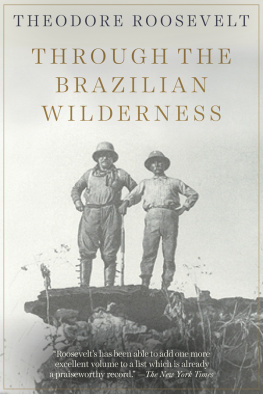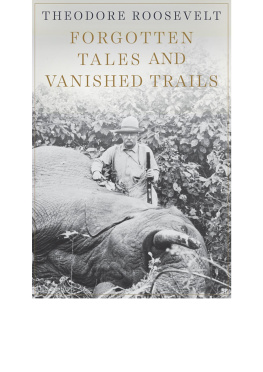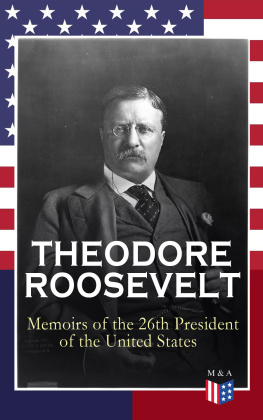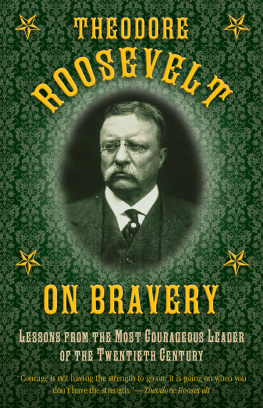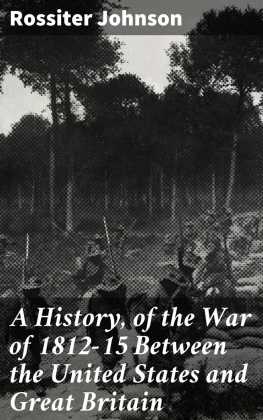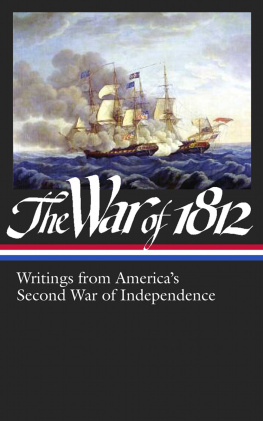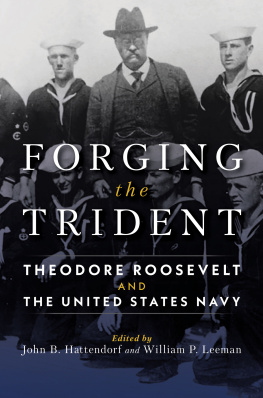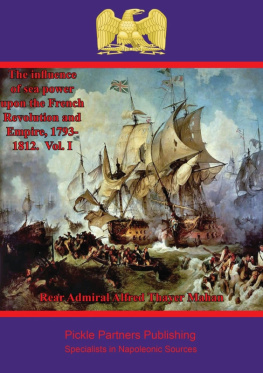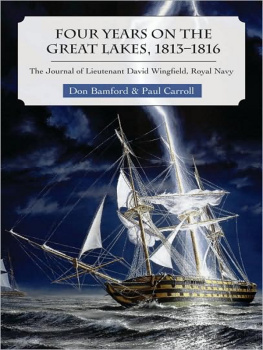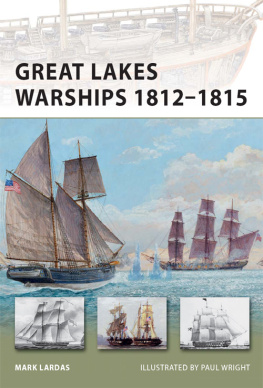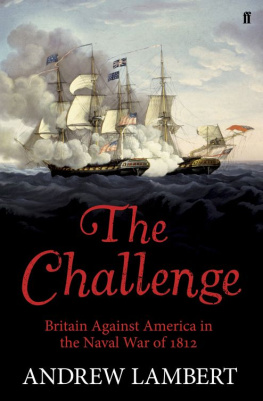Theodore Roosevelt - The Naval War of 1812, Volume 1: Or the History of the United States Navy During the Last War with Great Britain
Here you can read online Theodore Roosevelt - The Naval War of 1812, Volume 1: Or the History of the United States Navy During the Last War with Great Britain full text of the book (entire story) in english for free. Download pdf and epub, get meaning, cover and reviews about this ebook. year: 2011, publisher: Barnes & Noble, genre: History. Description of the work, (preface) as well as reviews are available. Best literature library LitArk.com created for fans of good reading and offers a wide selection of genres:
Romance novel
Science fiction
Adventure
Detective
Science
History
Home and family
Prose
Art
Politics
Computer
Non-fiction
Religion
Business
Children
Humor
Choose a favorite category and find really read worthwhile books. Enjoy immersion in the world of imagination, feel the emotions of the characters or learn something new for yourself, make an fascinating discovery.
- Book:The Naval War of 1812, Volume 1: Or the History of the United States Navy During the Last War with Great Britain
- Author:
- Publisher:Barnes & Noble
- Genre:
- Year:2011
- Rating:3 / 5
- Favourites:Add to favourites
- Your mark:
- 60
- 1
- 2
- 3
- 4
- 5
The Naval War of 1812, Volume 1: Or the History of the United States Navy During the Last War with Great Britain: summary, description and annotation
We offer to read an annotation, description, summary or preface (depends on what the author of the book "The Naval War of 1812, Volume 1: Or the History of the United States Navy During the Last War with Great Britain" wrote himself). If you haven't found the necessary information about the book — write in the comments, we will try to find it.
Published in 1882, when he was just twenty-four years old, this lively and at times pugnacious history established Roosevelt as somewhat of an iconoclast among historians, as he set out to disprove the prevailing idea that Americas naval victories in the War of 1812 were due more to luck than to skill. Volume One begins by discussing the causes of the war and the conflicting views of America and Britain. It describes battles on the ocean and on lakes in the years 1812 and 1813.
Theodore Roosevelt: author's other books
Who wrote The Naval War of 1812, Volume 1: Or the History of the United States Navy During the Last War with Great Britain? Find out the surname, the name of the author of the book and a list of all author's works by series.
The Naval War of 1812, Volume 1: Or the History of the United States Navy During the Last War with Great Britain — read online for free the complete book (whole text) full work
Below is the text of the book, divided by pages. System saving the place of the last page read, allows you to conveniently read the book "The Naval War of 1812, Volume 1: Or the History of the United States Navy During the Last War with Great Britain" online for free, without having to search again every time where you left off. Put a bookmark, and you can go to the page where you finished reading at any time.
Font size:
Interval:
Bookmark:
Or the History of the United States Navy During the Last War with Great Britain
THEODORE ROOSEVELT

This 2011 edition published by Barnes & Noble, Inc.
All rights reserved. No part of this publication may be reproduced, stored in a retrieval system, or transmitted, in any form or by any means, electronic, mechanical, photocopying, recording, or otherwise, without prior written permission from the publisher.
Barnes & Noble, Inc.
122 Fifth Avenue
New York, NY 10011
ISBN: 978-1-4114-5345-6
PREFACE TO THIRD EDITION
I ORIGINALLY intended to write a companion volume to this, which should deal with the operations on land. But a short examination showed that these operations were hardly worth serious study. They teach nothing new; it is the old, old lesson, that a miserly economy in preparation may in the end involve a lavish outlay of men and money, which, after all, comes too late to more than partially offset the evils produced by the original short-sighted parsimony. This might be a lesson worth dwelling on did it have any practical bearing on the issues of the present day; but it has none, as far as the army is concerned. It was criminal folly for Jefferson, and his follower Madison, to neglect to give us a force either of regulars or of well-trained volunteers during the twelve years they had in which to prepare for the struggle that any one might see was inevitable; but there is now far less need of an army than there was then. Circumstances have altered widely since 1812. Instead of the decaying might of Spain on our southern frontier, we have the still weaker power of Mexico. Instead of the great Indian nations of the interior, able to keep civilization at bay, to hold in check strong armies, to ravage large stretches of territory, and needing formidable military expeditions to overcome them, there are now left only broken and scattered bands which are sources of annoyance merely. To the north we are still hemmed in by the Canadian possessions of Great Britain; but since 1812 our strength has increased so prodigiously, both absolutely and relatively, while England's military power has remained almost stationary, that we need now be under no apprehensions from her land-forces; for, even if checked in the beginning, we could not help conquering in the end by sheer weight of numbers, if by nothing else. So that there is now no cause for our keeping up a large army; while, on the contrary, the necessity for an efficient navy is so evident that only our almost incredible short-sightedness prevents our at once preparing one.
Not only do the events of the war on land teach very little to the statesman who studies history in order to avoid in the present the mistakes of the past, but besides this, the battles and campaigns are of very little interest to the student of military matters. The British regulars, trained in many wars, thrashed the raw troops opposed to them whenever they had anything like a fair chance; but this is not to be wondered at, for the same thing has always happened the world over under similar conditions. Our defeats were exactly such as any man might have foreseen, and there is nothing to be learned from the follies committed by incompetent commanders and untrained troops when in the presence of skilled officers having under them disciplined soldiers. The humiliating surrenders, abortive attacks, and panic routs of our armies can be all paralleled in the campaigns waged by Napoleon's marshals against the Spaniards and Portuguese in the years immediately preceding the outbreak of our own war. The Peninsular troops were as little able to withstand the French veterans as were our militia to hold their own against the British regulars. But it must always be remembered, to our credit, that while seven years of fighting failed to make the Spaniards able to face the French, two years of warfare gave us soldiers who could stand against the best men of Britain. On the northern frontier we never developed a great general,Brown's claim to the title rests only on his not having committed the phenomenal follies of his predecessors,but by 1814 our soldiers had become seasoned, and we had acquired some good brigade commanders, notably Scott, so that in that year we played on even terms with the British. But the battles, though marked by as bloody and obstinate fighting as ever took place, were waged between small bodies of men, and were not distinguished by any feats of generalship, so that they are not of any special interest to the historian. In fact, the only really noteworthy feat of arms of the war took place at New Orleans, and the only military genius that the struggle developed was Andrew Jackson. His deeds are worthy of all praise, and the battle he won was in many ways so peculiar as to make it well worth a much closer study than it has yet received. It was by far the most prominent event of the war; it was a victory which reflected high honor on the general and soldiers who won it, and it was in its way as remarkable as any of the great battles that took place about the same time in Europe. Such being the case, I have devoted a chapter to its consideration at the conclusion of the chapters devoted to the naval operations.
As before said, the other campaigns on land do not deserve very minute attention; but, for the sake of rendering the account of the battle of New Orleans more intelligible, I will give a hasty sketch of the principal engagements that took place elsewhere.
The war opened in mid-summer of 1812, by the campaign of General Hull on the Michigan frontier. With two or three thousand raw troops he invaded Canada. About the same time Fort Mackinaw was surrendered by its garrison of 60 Americans to a British and Indian force of 600. Hull's campaign was unfortunate from the beginning. Near Brownstown the American Colonel Van Horne, with some 200 men, was ambushed and routed by Tecumseh and his Indians. In revenge, Colonel Miller, with 600 Americans, at Maguaga attacked 150 British and Canadians under Captain Muir, and 250 Indians under Tecumseh, and whipped them,Tecumseh's Indians standing their ground longest. The Americans lost 75, their foes 180 men. At Chicago the small force of 66 Americans was surprised and massacred by the Indians. Meanwhile, General Brock, the British commander, advanced against Hull with a rapidity and decision that seemed to paralyze his senile and irresolute opponent. The latter retreated to Detroit, where, without striking a blow, he surrendered 1400 men to Brock's nearly equal force, which consisted nearly one half of Indians under Tecumseh. On the Niagara frontier, an estimable and honest old gentleman and worthy citizen, who knew nothing of military matters, General Van Rensselaer, tried to cross over and attack the British at Queenstown; 1100 Americans got across and were almost all killed or captured by an equal number of British, Canadians, and Indians, while on the opposite side a larger number of their countrymen looked on, and with abject cowardice refused to cross to their assistance. The command of the army was then handed over to a ridiculous personage named Smythe, who issued proclamations so bombastic that they really must have come from an unsound mind, and then made a ludicrously abortive effort at invasion, which failed almost of its own accord. A British and Canadian force of less than 400 men was foiled in an assault on Ogdensburg, after a slight skirmish, by about 1000 Americans under Brown; and with this trifling success the military operations of the year came to an end.
Early in 1813, Ogdensburg was again attacked, this time by between 500 and 600 British, who took it after a brisk resistance from some 300 militia; the British lost 60 and the Americans 20 in killed and wounded. General Harrison, meanwhile, had begun the campaign in the Northwest. At Frenchtown, on the river Raisin, Winchester's command of about 900 Western troops was surprised by a force of 1100 men, half of them Indians, under the British Colonel Proctor. The right division, taken by surprise, gave up at once; the left division, mainly Kentucky riflemen, and strongly posted in houses and stockaded enclosures made a stout resistance, and only surrendered after a bloody fight, in which 180 British and about half as many Indians were killed or wounded. Over 300 Americans were slain, some in the battle, but most in the bloody massacre that followed. After this, General Harrison went into camp at Fort Meigs, where, with about 1100 men, he was besieged by 1000 British and Canadians under Proctor and 1200 Indians under Tecumseh. A force of 1200 Kentucky militia advanced to his relief and tried to cut its way into the fort while the garrison made a sortie. The sortie was fairly successful, but the Kentuckians were scattered like chaff by the British regulars in the open, and when broken were cut to pieces by the Indians in the woods. Nearly two thirds of the relieving troops were killed or captured; about 400 got into the fort. Soon afterward, Proctor abandoned the siege. Fort Stephenson, garrisoned by Major Croghan and 160 men, was attacked by a force of 391 British regulars, who tried to carry it by assault, and were repulsed with the loss of a fourth of their number. Some four thousand Indians joined Proctor, but most of them left him after Perry's victory on Lake Erie. Then Harrison, having received large reinforcements, invaded Canada. At the river Thames his army of 3500 men encountered and routed between 600 and 700 British under Proctor, and about 1000 Indians under Tecumseh. The battle was decided at once by a charge of the Kentucky mounted riflemen, who broke through the regulars, took them in rear, and captured them, and then, dismounting, attacked the flank of the Indians, who were also assailed by the infantry. Proctor escaped by the skin of his teeth and Tecumseh died fighting, like the hero that he was. This battle ended the campaign in the Northwest. In this quarter it must be remembered that the war was, on the part of the Americans, mainly one against Indians; the latter always forming over half of the British forces. Many of the remainder were French Canadians, and the others were regulars. The American armies, on the contrary, were composed of the armed settlers of Kentucky and Ohio, native Americans, of English speech and blood, who were battling for lands that were to form the heritage of their children. In the West the war was only the closing act of the struggle that for many years had been waged by the hardy and restless pioneers of our race, as, with rifle and axe, they carved out the mighty empire that we their children inherit; it was but the final effort with which they wrested from the Indian lords of the soil the wide and fair domain that now forms the heart of our great Republic. It was the breaking down of the last barrier that stayed the flood of our civilization; it settled, once and forever, that henceforth the law, the tongue, and the blood of the land should be neither Indian, nor yet French, but English. The few French of the West were fighting against a race that was to leave as little trace of them as of the doomed Indian peoples with whom they made common cause. The presence of the British mercenaries did not alter the character of the contest; it merely served to show the bitter and narrow hatred with which the Mother-Island regarded her greater daughter, predestined as the latter was to be queen of the lands that lay beyond the Atlantic.
Font size:
Interval:
Bookmark:
Similar books «The Naval War of 1812, Volume 1: Or the History of the United States Navy During the Last War with Great Britain»
Look at similar books to The Naval War of 1812, Volume 1: Or the History of the United States Navy During the Last War with Great Britain. We have selected literature similar in name and meaning in the hope of providing readers with more options to find new, interesting, not yet read works.
Discussion, reviews of the book The Naval War of 1812, Volume 1: Or the History of the United States Navy During the Last War with Great Britain and just readers' own opinions. Leave your comments, write what you think about the work, its meaning or the main characters. Specify what exactly you liked and what you didn't like, and why you think so.



